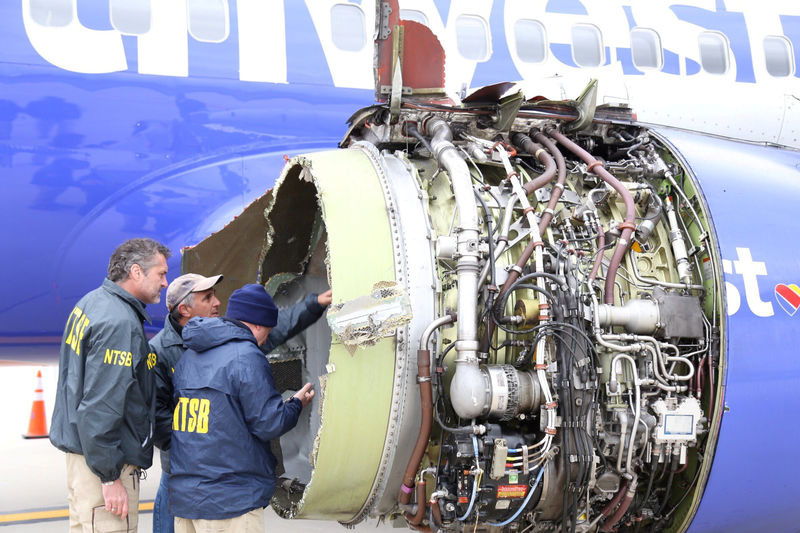By David Shepardson and Tim Hepher
WASHINGTON/PARIS (Reuters) - U.S. and European airline regulators on Friday ordered emergency inspections within 20 days of nearly 700 aircraft engines similar to the one involved in a fatal Southwest Airlines (N:LUV) engine blowout earlier this week, citing risks of a similar mishap.
The directives by the U.S. Federal Aviation Administration and the European Aviation Safety Agency for inspections of CFM56-7B engines, made by CFM International, indicated rising concerns since a similar failure in 2016 of the same type of engine.
The engine explosion on Southwest Airlines flight 1380 on Tuesday was caused by a fan blade that broke off, the FAA said. The blast shattered a window, killing a passenger, in the first U.S. passenger airline fatality since 2009.
"The unsafe condition," the FAA said in the order, "is likely to exist or develop in other products of the same design."
The inspections ordered are a sharp step-up from actions by both the European and U.S. regulators after a Southwest flight in August 2016 made a safe emergency landing in Pensacola, Florida, after a fan blade separated from the same type of engine and debris ripped a hole above the left wing. The European agency had given airlines nine months to check engines, while U.S. regulators still were considering what to do.
Ultrasonic inspections on fan blades that have been used in more than 30,000 cycles, or in service for about 20 years, will be required in the next 20 days, the agencies said on Friday. A cycle includes one take-off and landing.
That order will affect about 680 engines globally, including about 350 in the United States, the FAA said. The engine that blew apart on Tuesday's Southwest flight would have been affected, since the company said it had 40,000 cycles.
The coordinated 20-day measure partially resolves a gap in previous responses to the 2016 accident by the world's two largest and most influential aviation regulators, a person familiar with the discussions said and published documents show.
The FAA in August 2017 drafted an order giving airline up to 18 months to carry out checks, but it had not finalized the measure by the time of Tuesday's fatal second accident.
The EASA had rejected a request by one airline to double the time allowed for checks to 18 months, matching the FAA's roll-out, saying data did not justify that.
The divergence marked a rare difference of approach between the two agencies, especially on one of the world's most-used aviation products. CFM, which is jointly owned by General Electric Co (N:GE) and France's Safran (PA:SAF), produces the CFM56 engine in factories based both in the United States and in Europe.
"It happens that there are disagreements about the right way to go in some cases, and this was one of them," the person familiar with the discussions said.
On Tuesday, however, when news broke that a second failure had taken place involving the same model engine, aircraft and airline - this time killing a passenger who was partially pulled through a gaping hole next to her seat - the two agencies agreed to act quickly, the person said.
An FAA spokesman said the agency disputed that it had not agreed with European regulators on the response to the engine issue. An EASA spokesman declined to comment.
On Wednesday, National Transportation Safety Board (NTSB) Chairman Robert Sumwalt, the chief investigator of U.S. aviation accidents, said he could not yet say if the incident pointed to a fleet-wide issue. The NTSB declined to comment on Friday.
The FAA and NTSB have different roles. Investigators study the probable cause of single accidents and recommend possible changes to safety rules, while regulators have to assess whether safety risks could appear.
Several major airline officials said the order will primarily impact airlines with higher utilization of aircraft covering shorter routes like Southwest.
Southwest, which had opposed efforts by the engine maker last year to shorten the FAA’s earlier proposed deadline, on Friday said its maintenance program meets or exceeds the new requirements.
United Continental Holdings (N:UAL) said that it had begun inspections earlier after a recommendation from CFM. American Airlines (O:AAL) said it does not have any CFM56-7B engines with 30,000 cycles and would not be impacted by the 20-day order. Delta Air Lines (N:DAL) said it had begun complying and did not expect any operational impact to customers
Approximately 14,000 CFM56-7B engines are in operation.
CFM had initially recommended the inspections.
The European order requires that after the first inspection, airlines should keep repeating the process every 3,000 cycles, which typically represents about two years in service.
More than 150 have already been inspected.

Inspections recommended by the end of August will affect an additional 2,500 engines.